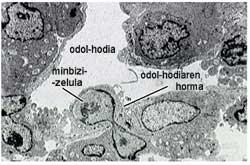Metastasis
In the case of cancer, the eradication of primary tumors is increasingly easy, but the extent of tumors makes the risk of mortality still high.

Metastasis is the result of a series of changes in cancer cells. Cytochelet is the one that maintains the overall structure of the cell, and before metastasis occurs noticeable changes in the cytoskeleton occur. On the other hand, the adhesion capacity of the cells is lost and their mobility is increased. From here you can pass both the lymphatic system and blood vessels and go far and spread the cancer.
However, the molecular basis of these changes remains unknown. In colon cancer it seems that the main responsible is primarily the protein called PLR-3, since in cases of metastases researchers have observed that this protein is formed in large amounts. In addition, the gene encoding this enzyme is repeated several times on the same chromosome in cases of tumor extension.
It must be said that research has only begun. First, they should determine the biochemical and physiological functions of PLR-3. Subsequently, the main objective of this work will be the search for molecules that can inhibit the function of PRL-3 and study whether this inhibition can prevent metastasis in order to develop new treatments.
Buletina
Bidali zure helbide elektronikoa eta jaso asteroko buletina zure sarrera-ontzian








